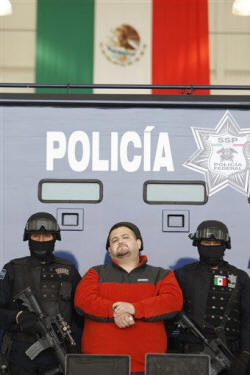|

Mexico-US cooperation cited in 2nd druglord arrest
 Send a link to a friend
Send a link to a friend
[February 04, 2010]
TIJUANA, Mexico (AP) -- The capture of a brutal druglord accused of ordering massacres, beheadings and the dissolving of bodies in caustic soda marks the second time in less than a month Mexico has taken down one of its most powerful traffickers.
Teodoro Garcia Simental, known as "El Teo," was seized by federal troops Tuesday when they stormed a seaside vacation home near the southern tip of the Baja California peninsula.
|
|
 The arrest of the Tijuana-based trafficker is considered another victory for the enhanced surveillance techniques being cultivated with the assistance of Washington. U.S. anti-drug officials had been helping Mexican authorities track Garcia for more than five months. The arrest of the Tijuana-based trafficker is considered another victory for the enhanced surveillance techniques being cultivated with the assistance of Washington. U.S. anti-drug officials had been helping Mexican authorities track Garcia for more than five months.
The arrest also raised hopes among the families of hundreds of people missing and believed killed by Garcia's gang, their bodies dissolved in vats of caustic soda so no trace was ever found.
"I have received calls from Guadalajara, Mazatlan and Mexicali, from the families of people who disappeared in Tijuana and hope that this man will confess to where he left the bodies of their sons, wives and fathers," said Cristina Palacios, president of a victims rights groups representing the families of the disappeared.

Palacios said that of the more than 300 cases of missing people documented by the group between 2007 and 2009, 60 percent to 70 percent are linked to Garcia's gang, which used the services of Santiago Meza Lopez, known as "The Stewmaker," who authorities say confessed to dissolving 300 bodies.
Authorities say Garcia, in his mid-30s, ordered his rivals disposed of in especially grisly ways. Those who weren't dissolved were sometimes beheaded and their bodies hung from bridges. He took hefty ransom payments from kidnapping Tijuana business leaders.
He is also believed to be behind many of the dozens of assassinations of Tijuana police officers over the last two years.
Ramon Eduardo Pequeno, head of the federal police's anti-drug unit, said Garcia had recently stepped up efforts to kill Baja California's attorney general, Rommel Moreno, and Tijuana's public safety chief, Julian Leyzaola.
"Tijuana has been living through some very bad times, but victories like this are what keep us moving forward," said Tijuana Mayor Jorge Ramos.
President Felipe Calderon launched an all-out war upon taking office in December 2006, sending thousands of troops out to combat the drug gangs. But until recently the government had little success in taking down the top kingpins, and Mexicans have been growing increasingly frustrated with a war that has left more than 15,000 casualties.
That changed Dec. 16, when another drug lord, Arturo Beltran Leyva, was killed in a raid by Mexican marines in the colonial city of Cuernavaca, south of Mexico City. Authorities said U.S. Drug Enforcement Administration officials helped them track Beltran Leyva as well.
On Jan. 2, federal officials arrested his brother, Carlos Beltran Leyva.
[to top of second column] |
 "The government is being more subtle with regard to its pursuit of drug traffickers," said George W. Grayson, a Mexico expert at the College of William and Mary in Williamsburg, Virginia. "It's relying much more on electronic techniques, eavesdropping, inspection of one's lifestyle. It's also paying pretty good money to informants."
U.S. Ambassador Carlos Pascual said Garcia's arrest shows the sharing of information between U.S. and Mexican law enforcement is producing results.
"Mexico's operational capacity is growing," Pascual said in a statement. "We continue to improve our sharing of information. The Mexican government is unrelenting in its determination and commitment."
More than 150 federal troops raided a two-story, vacation home near the city of La Paz, shooting at the door and then barging in, said a neighbor who asked not to be identified out of fear the gang could retaliate. The troops quickly escorted Garcia and another man out of the home and into SUVs.
Police seized two rifles, 19 mobile phones, two laptop computers and more than $35,000 in Mexican and U.S. currency, Pequeno said.

Garcia appeared with authorities in Mexico City looking much heavier than in two photos of him that had been widely circulated. Another alleged trafficker, Diego Raymundo Guerrero, was also detained.
Garcia joined the Tijuana-based Arellano Felix cartel in 1995, Pequeno said, and rose through the ranks. He broke from the group in an April 2008 shootout, plunging the city across the border from San Diego into a period of unprecedented violence. More than 1,500 people have been murdered in Tijuana since the beginning of 2008.
[Associated
Press; By ELLIOT SPAGAT]
Associated Press writers Ignacio Martinez in La Paz and Catherine Shoichet and Julie Watson in Mexico City contributed to this report.
Copyright 2010 The Associated
Press. All rights reserved. This material may not be published,
broadcast, rewritten or redistributed.
 |